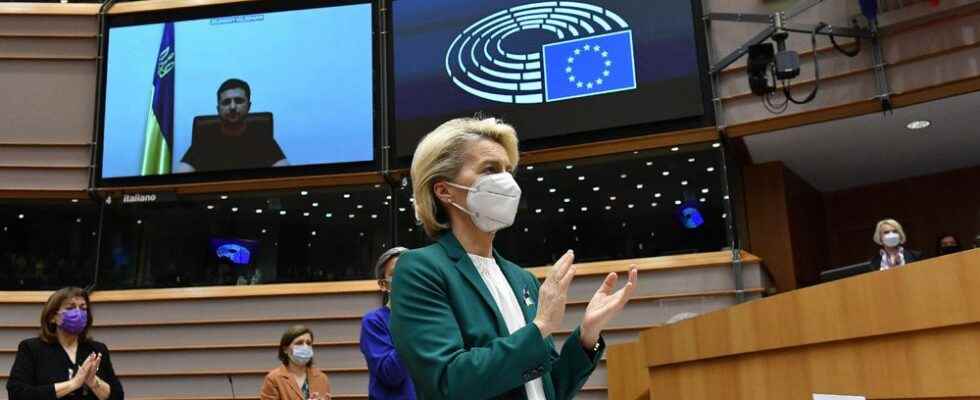From Versailles to… Versailles. With the hope of a new start in the Franco-Russian relationship, it was in the castle of Louis XIV that Emmanuel Macron had welcomed Vladimir Poutine, a month after his victory in the presidential election of 2017. Almost five years later , at the end of his mandate, and in the midst of the French presidency of the Council of the European Union (EU), he received the other Member States there for a summit during which, again, there would be a lot of talk about Russia, whose the army leads an invasion of Ukraine.
Originally, the Twenty-Seven were to work, on Thursday March 10 and Friday March 11, on the “new growth model” of their common market. But the war in the East has upset the agenda, even if it will always be about the future of the EU. Defence, energy independence, support for Ukraine: there is no shortage of subjects.
First, energy. With the ambition of “dealing a powerful blow to Putin”, US President Joe Biden announced on Tuesday a ban on imports of Russian oil and gas into the United States. The EU, for its part, refuses such an embargo. And for good reason: Russia provides 40% of its natural gas needs and 30% in oil, while the prices of electricity and fuel at the pump have soared in recent weeks. Discussions will focus, at this stage, on how to reduce energy dependence in Moscow.
European leaders will notably be able to discuss the emergency plan unveiled on Wednesday by the Commission, called “REPowerEU”. He proposes to focus on the production and import of biomethane and hydrogen to reduce EU demand for Russian gas by two thirds by the end of the year. The Commission also wants to submit a legislative proposal aimed at ensuring an average level of gas storage of at least 90% by the end of September.
The idea of a new recovery plan
Another issue: is a new recovery plan needed to strengthen Europe’s defense capabilities? Several countries have announced an increase in their military budget, starting with Germany, which has released 100 billion euros to modernize its army.
In recent days, some member states have been talking about the possibility of a new common European loan, concentrated on sectors that have shown vulnerability in recent weeks, such as defense and energy. Either a recovery plan modeled on the one developed during the Covid-19 crisis. France and the Latin countries are more for it. The countries of the North, starting with the Germans, rather against it. “It is possible that part of the funds provided for the recovery plan linked to the Covid crisis will be redirected”, specifies Sébastien Maillard, director of the Jacques Delors Institute.
In the absence of a new recovery plan, the Twenty-Seven could extend the suspension of the stability pact until the end of 2023. “The rules for calculating deficits could be reviewed, excluding defense investments in addition to green investments,” he continues. The question of defense will be on the menu of the next summit, in Brussels, on March 24 and 25. On this occasion, the Twenty-Seven must adopt their “strategic compass”, that is to say their roadmap in terms of defence, security and foreign policy. “It is in the process of being profoundly overhauled, indicates Sébastien Maillard. The objective is to take advantage of the unity of the Member States to strengthen it.”
European Commission President Ursula von der Leyen applauds Ukrainian President Zelensky, who speaks by videoconference during a session of the European Parliament, March 1, 2022.
afp.com/JOHN THYS
What mark of support for Ukraine?
Finally, continental leaders are expected to discuss political support for Kiev, beyond ongoing arms deliveries and humanitarian aid. In response to the Russian invasion, the European Commission paved the way for Ukraine’s EU membership. The approach is above all symbolic, membership requiring the unanimity of the Member States and several years of evaluation.
The MEPs nevertheless adopted, in the process, a resolution – non-binding – to this effect, on March 1, after an intervention by Ukrainian President Volodymyr Zelensky by videoconference. He also spoke to the UK House of Commons on Tuesday. “It would be a strong gesture for him to be able to speak to European leaders at the next council meeting”, pleads Sébastien Maillard. And strengthen a little more the determination of the Twenty-Seven against Putin.
